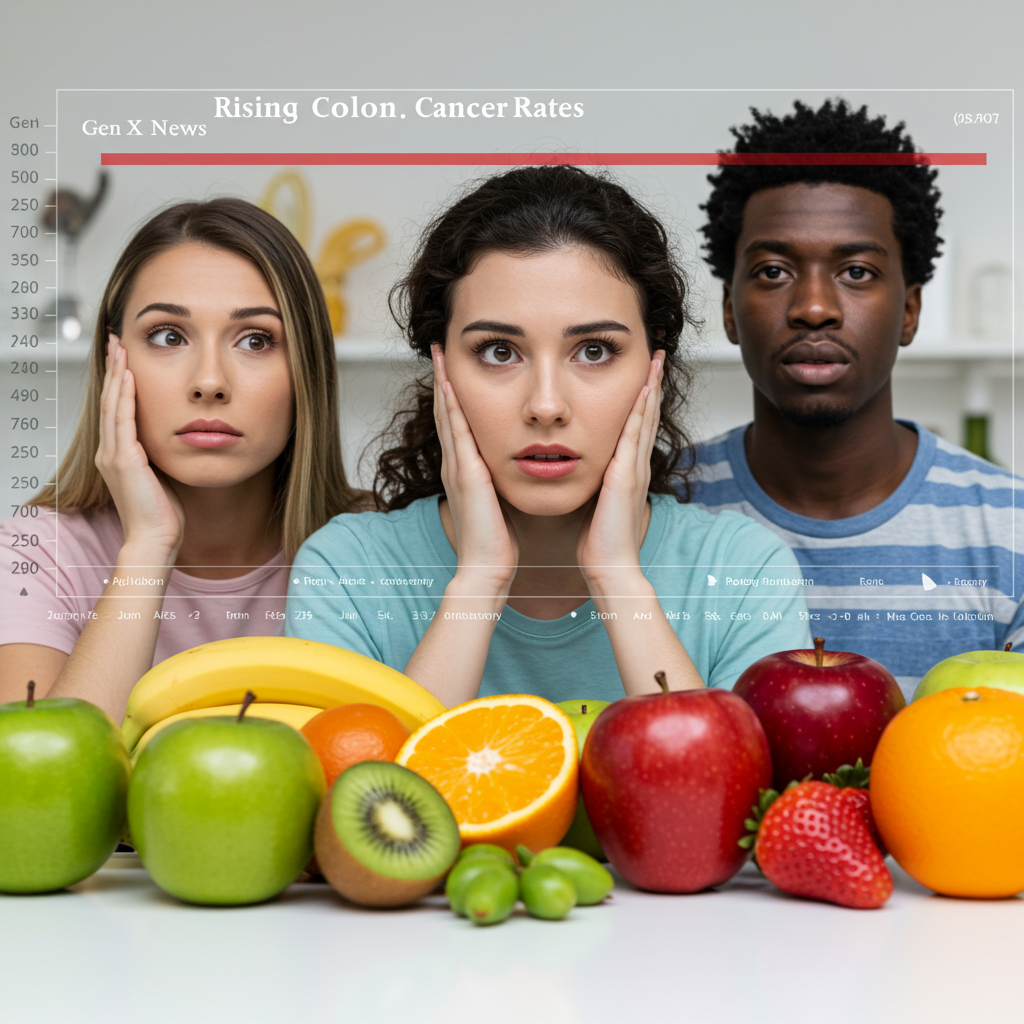A worrying trend is emerging in public health: colon cancer diagnoses are rapidly surging among young adults, a demographic traditionally considered low-risk. This shift means that colorectal cancer, once primarily affecting older individuals, now poses a significant threat to Gen X, Millennials, and even Gen Z. Experts are pointing to crucial lifestyle factors and dietary habits as key contributors to this alarming rise, emphasizing that proactive measures are more vital than ever.
Colorectal cancer, which forms in the tissues of the colon or rectum, is now the second leading cause of cancer death in the United States, impacting over 100,000 Americans annually. While it’s vital to note that early detection significantly improves outcomes, the disease often begins as small polyps in the large intestine. If left unchecked, these can develop into cancerous conditions like adenocarcinoma.
The Alarming Rise of Colon Cancer in Younger Generations
The statistics paint a stark picture: approximately 20,000 Americans under 50 are projected to be diagnosed with colorectal cancer this year, with an estimated 3,750 deaths within this age group. Since the mid-1990s, cases among those under 50 have soared by about 50%. This unsettling trend is expected to continue, with projections indicating a 90% increase in cases for younger adults by 2030. The increase affects all ethnic and racial groups.
Why Are Young Adults at Higher Risk?
While research continues, a growing body of evidence strongly links this uptick to modern dietary patterns and lifestyle choices. Factors such as rising rates of obesity and increased alcohol consumption are identified culprits. Emerging studies also explore the complex roles of vitamin D deficiency and the gut microbiome in cancer development. Importantly, the widespread consumption of highly processed foods and sugary drinks appears to play a significant role. For instance, a 2021 study revealed that women consuming more than two sugary drinks daily faced over double the risk of early-onset colorectal cancer. Another study in March highlighted that individuals prioritizing fresh, minimally processed foods were less likely to develop colon cancer compared to those who frequently consumed ultra-processed options like processed meats, pre-packaged sweets, and ready-to-eat meals.
Power Up Your Plate: Fruits to Slash Your Risk
While no single food can prevent or cure cancer, a diet rich in whole, unprocessed foods – often referred to as “nature’s basket” – is a powerful protective strategy. US-based Gastroenterologist Dr. Joseph Salhab, referencing a 2023 study in the World Journal of Gastroenterology, specifically highlights four fruits for their potential to significantly reduce colon cancer risk.
Watermelon: The Lycopene Powerhouse
This refreshing fruit isn’t just for summer picnics. Watermelon is linked to a 26% reduction in colon cancer risk. Its key beneficial compound is lycopene, a potent antioxidant that actively protects cells from damage. Beyond its antioxidant properties, watermelon’s high water content promotes digestive health and regular bowel movements, crucial for a healthy colon.
Apples: Fiber & Polyphenol Heroes
An apple a day might truly keep the doctor away, especially when it comes to colon health. Higher consumption of apples has been shown to reduce colon cancer risk by 25%. They are packed with gut-friendly fiber, essential for digestive regularity, and rich in polyphenols, which offer powerful antioxidant and anti-inflammatory benefits that contribute to cellular protection.
Kiwi: Your Gut-Friendly Vitamin C Boost
Small but mighty, kiwi can contribute to a potential 13% lower colorectal cancer risk. This fuzzy fruit is an excellent source of fiber, aiding digestion and preventing constipation. It’s also brimming with Vitamin C, a vital nutrient for immune function, heart health, and even skin repair. These combined benefits make kiwi a valuable addition to a cancer-preventative diet.
Citrus Fruits: Antioxidant Champions
Oranges, grapefruits, lemons, limes, and tangerines aren’t just for juice. A higher intake of these vibrant fruits is associated with a 9% decrease in colon cancer risk, with an optimal intake around 120 grams per day. They are abundant in Vitamin C, which functions as a robust antioxidant, neutralizing harmful free radicals and minimizing DNA damage. Additionally, citrus fruits contain flavonoids, a type of polyphenol known for slowing aging, reducing inflammation, and supporting overall cancer prevention.
Beyond Fruit: A Holistic Approach to Prevention
While the power of specific fruits is evident, effective colon cancer prevention hinges on a comprehensive approach. A high-fiber, plant-rich diet is paramount.
The Critical Role of Fiber
Every extra 10 grams of dietary fiber consumed daily can reduce colon cancer risk by approximately 7%. Fiber aids digestion, promotes regular bowel movements, and supports a healthy gut microbiome, all of which are crucial for colon health. This means prioritizing whole grains, legumes, vegetables, and, of course, a variety of fruits.
What to Limit: Foods That Fuel Risk
Just as important as what you add to your diet is what you choose to limit or eliminate. Studies indicate that reducing or cutting out processed and red meats, sugary beverages, and ultra-processed foods is essential. Some research even suggests that a diet high in these items can increase colon cancer risk by up to 40%. Furthermore, a 2019 study on Stage 3 colon cancer patients found that those who frequently consumed insulin-spiking foods (like white bread, sugary drinks, and processed snacks) were twice as likely to experience recurrence or death.
Maintaining a healthy weight and engaging in regular physical activity further reduce inflammation throughout the body and contribute to a lower overall risk of digestive cancers. Combining these dietary changes with consistent exercise is a powerful strategy for prevention.
Don’t Wait: Know the Signs and Get Screened
Early detection is critical for successful treatment of colorectal cancer. It’s essential for everyone, especially younger adults, to be aware of the signs and to prioritize screening.
Recognize the Early Warning Signals
Symptoms can be subtle and easily dismissed, particularly by younger individuals who might attribute them to less serious conditions like hemorrhoids. Be vigilant for:
Blood in stool: Bright red or very dark.
Changes in bowel habits: Persistent diarrhea or constipation, changes in stool consistency, or a feeling of incomplete emptying.
Unexplained weight loss.
Persistent bloating or abdominal fullness.
- Chronic fatigue.
- timesofindia.indiatimes.com
- timesofindia.indiatimes.com
- timesofindia.indiatimes.com
- timesofindia.indiatimes.com
- www.npr.org
If you experience any of these symptoms, do not hesitate to consult a doctor, regardless of your age.
When to Start Screening: Age 45 and Beyond
The American Cancer Society (ACS) revised its recommended colorectal cancer screening age from 50 to 45 in 2018. This updated guideline acknowledges the rising incidence in younger adults. If you are 45 or older, discuss screening options with your healthcare provider.
Discuss Your Family History
Family history plays a significant role in individual risk. If you have a first-degree relative (parent, sibling, or child) diagnosed with colorectal cancer or polyps, you should begin screening 10 years earlier than the age at which your family member was diagnosed. For example, if your father was diagnosed at 45, you should consider screening at 35.
Exploring Your Screening Options
While colonoscopy is a gold standard, especially for higher-risk individuals, other effective and less-invasive options exist. These include sigmoidoscopy (a partial colon evaluation) and various stool-based tests like the annual FIT test (fecal immunochemical test), which detects trace amounts of blood, or the tri-annual stool DNA test (e.g., Cologuard), which detects both blood and DNA changes. The best screening test is ultimately the one you are most likely to complete consistently.
Taking Charge of Your Gut Health
The rising rates of colon cancer in younger populations serve as a critical wake-up call. While genetics and other factors play a role, lifestyle choices, particularly diet, are significant modifiable risk factors. By embracing a diet rich in fiber-packed fruits like watermelon, apples, kiwi, and citrus, alongside other whole, unprocessed foods, and limiting harmful items, you can dramatically improve your gut health and reduce your risk. Paired with regular physical activity and proactive screening, you can empower yourself against this growing health challenge.
Frequently Asked Questions
Why is colon cancer increasing in younger adults?
Colon cancer diagnoses are rising significantly among younger adults, a trend linked to modern lifestyle factors. Key contributors include increasing rates of obesity and higher alcohol consumption. Dietary changes, particularly a greater reliance on ultra-processed foods, sugary drinks, and red/processed meats, are also strongly implicated. Research indicates these habits contribute to inflammation and other cellular changes that can increase risk.
What are the key signs of colon cancer young adults should watch for?
Young adults should be particularly vigilant for persistent changes in bowel habits, such as new onset constipation or diarrhea, or changes in stool consistency. Other critical warning signs include unexplained weight loss, persistent abdominal bloating or fullness, chronic fatigue, and any presence of blood in the stool (either bright red or very dark). These symptoms warrant immediate medical evaluation, regardless of age.
Besides fruits, what lifestyle changes significantly reduce colon cancer risk?
Beyond incorporating beneficial fruits, adopting a high-fiber, plant-rich diet is crucial, with studies showing a 7% risk reduction for every 10 grams of fiber added daily. It’s also vital to limit or avoid processed and red meats, sugary drinks, and ultra-processed foods. Furthermore, maintaining a healthy weight and engaging in regular physical activity are essential. For early detection, individuals aged 45 and older, or those with a family history, should prioritize timely screening.




